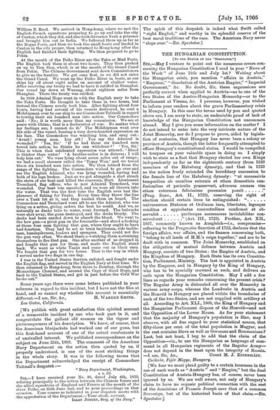[To T55 EDITOR Or THE - spzezazos...1 Snt, — May I venture to
point out the numerous errors con- cerning the Hungarian Constitution I read in your "News of the Week" of June 24th and July 1st P Writing about the Hungarian crisis, you mention "affairs in Austria," "Emperor," "dissolution of the Austrian Empire," "Imperial Government," &c. No doubt, Sir, these expressions are perfectly correct when applied to Austria—as to one of the two States of the Austro-Hungarian Monarchy—or to the Parliament at Vienna, &c. I presume, however, you wished to inform your readers about the grave Parliamentary crisis in Hungary. In this case the terms used by you and quoted above are, I am sorry to state, an undeniable proof of lack of knowledge of the Hungarian Constitution not uncommon abroad. May I give you some information on the matter ? I do not intend to enter into the very intricate nature of the Joint Monarchy, nor do I propose to prove, aided by legisla- tion of centuries, that Hungary has never been a colony or province of Austria, though the latter frequently attempted to efface Hungary's constitutional status. I would be compelled to trespass on your valuable space in doing so. I simply wish to state as a fact that Hungary elected her own Kings independently as far as the eighteenth century (from 1526 members of the Habsburg dynasty), and that in 1723 as the nation freely extended the hereditary succession to the female line of the Habsburg dynasty: " nt successivis temporibus ab omnibus externis et etiam domesticis con- fusionibus et periculis praeservari, adversus omnem vim
etiam externam felicissime perennire possit (Prag. Sane., Art. IL, 1723), reserving the right of election should certain lines be extinguished: universorum Statuum et Ordinum libertates, legesque conditas et approbatas consuetudines confirmat et ob servabit - pariterque successores inviolabiliter con-
servabunt "(Art. I 1723). Further, Art. XI, 1867, commonly known as Ausgleich—i.e., compromise— referring to the Pragmatic Sanction of 1723, declares that the foreign affairs, war affairs, and the finance concerning both, "belong to all lands of H.M.'s reign together," and are to be dealt with in common. The Joint Monarchy, established on the obligation of mutual defence between Austria and Hungary, consists of two States : the Empire of Austria, and the Kingdom of Hungary. Each State has its own Constitu- tion, Parliament, Ministry. The last is appointed in Austria by the Emperor, and in Hungary by the King of Hungary, who has to be specially crowned as such, and delivers an oath upon the Hungarian Constitution. May I add a few lines as regards your remarks concerning the present crisis? The Regular Army is dislocated all over the Monarchy in various army corps, whereas the Landwehr in Austria and the Honved in Hungary are placed within the boundaries of each of the two States, and are not supplied with artillery at all. According to Art. XLL, 1868, the King of Hungary and the Hungarian Parliament dispose of the Honved—and not the Opposition of the Lower House. As for your statement that the majority of Hungary's population is Slav, may I observe, with all due regard to your statistical source, that fifty-three per cent. of the total population is Magyar, and the rest contains Slays as well as Germans and Roumanians ? Last, but not least, I beg to add that the claim of the Opposition—viz., to use the Hungarian as language of com- mand in all Hungarian regiments of the Regular Army does not depend in the least upon the integrity of Russia.
—I am, Sir, &e., Count M. J. ESTERHAZY. Cscikvcir, Fejer Megye, Hungary.
[We fear we must plead guilty to a certain looseness in the use of such words as " Austria " and "Empire," but the dual Constitution of Austria-Hungary has, of course, never been ignored by us. We are well aware, not only of Hungary's claim to have no organic political connection with the rest of the dominions of Francis Joseph save that of a common Sovereign, but of the historical basis of that claim.—ED. Spectator.]






































 Previous page
Previous page